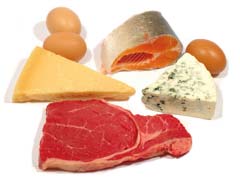Proteins
Proteins are one of the essential food ingredients, described as either first class proteins, or second class proteins, made up of long chain amino acids, either essential or non-essential.
 First class proteins contain sufficient amounts of all the essential amino acids e.g. meat, fish, eggs and dairy products.
First class proteins contain sufficient amounts of all the essential amino acids e.g. meat, fish, eggs and dairy products.
Second class proteins contain just some of the essential amino acids; vegetarian diets need to be carefully balanced, as vegetable proteins are second class.
Twenty-two amino acids have been identified as necessary for body growth, rebuilding of cells and health.
Fourteen of these amino acids can be made within the body (non-essential) whilst eight (essential) must be obtained via food.
Vegetarians can obtain their protein requirements from such foods like beans, rice, tofu, quorn and most nuts and seed foods. Protein drinks and shakes are often high in whey protein and are a good source of protein supplement.
Recommended Amounts:
A good general rule of thumb for determining protein requirements would be one gram of protein for every kilogram (2.2 lbs.) of body weight.
This rule does not take into account a persons body composition, activity level, age or for women only, pregnancy.
Aim to have the amount balanced out through out your meals, as your body cannot store protein.
The following page gives an outline for protein consumption for different ages.